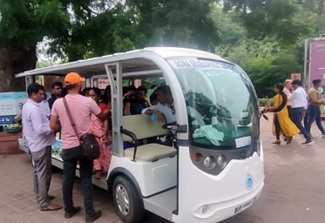
April17,2023: The effect of the Electric Vehicle (EV) revolution on the tourism and travel sector will be massive in the coming years. Increasing the range of EVs making it easier to charge during journeys, and providing readily reachable charging facilities in hotels, tourist hubs, and other hotspots will bring greater faith among travellers writes Irfan Khan, founder of electric mobility platform eBikeGo, in an article for Travel News Daily.
One of the most visited tourist places in the country is the Taj Mahal which restricts petrol and diesel automobiles near it displaying the seriousness of the government’s anti-pollution approach. The restriction is pertinent within a 500-meter distance from the spot.
Despite these restrictions, the availability of Electric Vehicles cabs in the region has enabled a hassle-free travel experience for visitors. In addition, many topline hotels in the city of Agra provide tourists with access to e-bikes to get around. This is not only economical due to the avoidance of fossil fuels, but it also limits the problem of traffic congestion and pollution in alike tourist-centric cities.
Electric vehicles can help travellers by enabling them to reach secret trails that are typically unavailable via normal transportation as well as vacation destinations. Additionally, smart EV charging infrastructure is expanding in cities like Delhi, Bangalore, Goa, and others, making the use of electric vehicles more acceptable.
Long before electric vehicles became popular for environmental considerations, the Taj Westend in Bangalore as well as many resorts on Goa beach fronts, went electric and provided buggies for guest movement between cottages and the main lobby .
Gen Z travellers are more worried about the importance of selecting an eco-friendly travel option in their travels – and the availability of e-transport is a big plus point.
Electric Vehicles in the tourism sector will bring greater sustainability and also prove to be potentially profitable for the overall business.